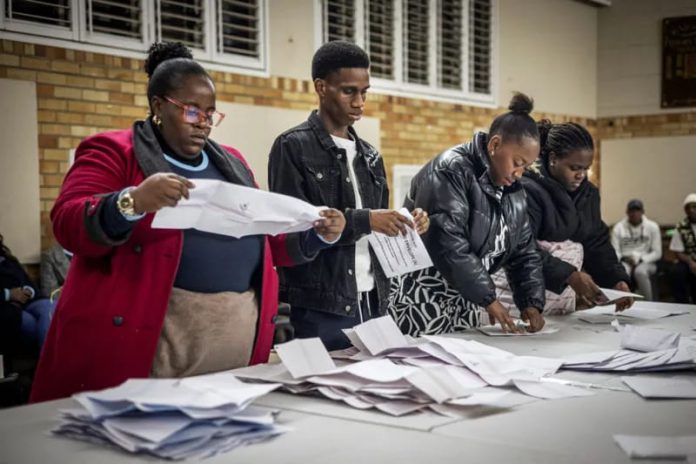The ruling African National Congress (ANC) is leading other political parties in the first results announced by the South African Electoral Commission.
With results from just over 11% voting districts counted so far, the ANC is leading with 43%, followed by the DA with 26%.
The radical EFF and the uMkhonto weSizwe Party (MK Party) of former President Jacob Zuma are on around 8%.
Final results are expected over the weekend.
Opinion polls suggest the ANC could lose its majority in parliament for the first time in 30 years, forcing it into a coalition.
The ANC has lost support due to anger over high levels of corruption, crime and unemployment. But it is too early to predict the final outcome.
Thursday’s election saw long lines of voters outside polling stations late into the night across the country.
One electoral official in Johannesburg told the BBC the queues were reminiscent of the historic 1994 election, when black people could vote for the first time, and which saw Nelson Mandela become president.
Many thousands of people were still waiting to vote when polls officially closed at 2100 local time (1900 GMT) but the electoral commission said they would all be allowed to cast their ballots.
Sifiso Buthelezi, who voted in Johannesburg’s Joubert Park – the biggest polling station in South Africa – told the BBC: “Freedom is great but we need to tackle corruption.”
Change has been a recurring sentiment, especially among young voters.
Ayanda Hlekwane, one of South Africa’s “born-free” generation, meaning he was born after 1994, said despite having three degrees he still doesn’t have a job.
“I’m working on my PhD proposal so that I go back to study in case I don’t get a job,” he tells the BBC in Durban. But Mr Hlekwane said he was optimistic that things would change.
A record 70 parties and 11 independents were running, with South Africans voting for a new parliament and nine provincial legislatures.
Analysts say this shows that many people are disillusioned with the ANC.
“We are entering the next phase of our democracy, and it is going to be a big transition,” political analyst Richard Calland told the BBC.
“We will either become a more competitive and mature democracy, or our politics will become more fractured.”
The main opposition party, the Democratic Alliance (DA), has signed a pact with 10 other parties, agreeing to form a coalition government if they get enough votes to dislodge the ANC from power.
But this is highly unlikely, with the ANC expected to remain the biggest party, putting it in pole position to lead a coalition if its support does drop below 50%.
It got 57.5% of the vote in the last election compared to the DA’s 21%.












